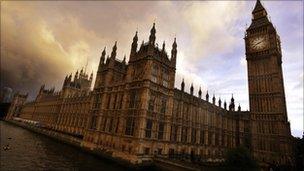Free transport may go to 'offset welfare reform'
- Published

The bill is currently passing through Westminster
Free transport for better off pensioners may have to be withdrawn to help offset the impact of welfare reform in Northern Ireland, according to the social development minister.
Nelson McCausland was speaking at an event organised by the four main churches in Belfast on Wednesday night.
He said £300m a year of benefits controlled by the NI Executive might have to be re-allocated to the needy.
Mr McCausland conceded such a move would be radical.
A leading charity working with older people said there could be circumstances where the principle of universal free transport for all pensioners could be changed.
Age NI's chief executive Anne O'Reilly said the issue should be considered, provided protections were in place.
"We need to be thinking about how we make sure that the resources that we do have go to those in greatest need," she said.
"So the implication of that would be that people who can afford it, as long as we protect those who cannot, should be thinking differently about accessing benefits and support like this."
Mr McCausland said it was time to start a debate about the future of things such as free transport and winter fuel payments.
"As minister, I have already challenged some of the proposals and am working with my executive colleagues to find ways to minimize the most negative aspects of these reforms," he said.
"While it is possible to make some adjustments to operational delivery, it is essential to maintain parity with the rest of the United Kingdom in delivering the reforms.
"I am committed to ensuring that the most positive aspects of these changes; those that will make work pay for people, those that will help move people closer to the workplace, and those that will ensure our welfare system is sustainable for future generations - are maximized in Northern Ireland."
Meanwhile, Northern Ireland's church leaders called for more clarity regarding the proposed legislation.
The church leaders involved were Cardinal Seán Brady, Archbishop Alan Harper, Presbyterian Moderator Dr Ivan Patterson, Methodist President Rev Ian Henderson and President of the Irish Council of Churches, Dr Richard Clarke.
"Our primary concern as church leaders has been to clarify the implications of the Social Welfare reforms passing through Westminster for the people of Northern Ireland," said Cardinal Brady.
'Negative consequences'
"We want to respectfully challenge those who hold authority in civil society to act with justice and to show compassion to those most in need. Those with the least capacity to suffer cuts should not be made to suffer more.
"We want to express our concern at the potentially dramatic and negative consequences for some of the most vulnerable in our society and for the wider economy in Northern Ireland."
The event was also attended by Secretary of State Owen Paterson.
Mr Paterson said: "Those who are too sick or disabled to work will always receive support from the state as they should.
"It is for the executive in Northern Ireland to bring forward the legislation here once the bill has been passed in Westminster, and for legal and practical reasons parity should be maintained.
"There will, however, be areas where the executive will want flexibility to fit local circumstances and we will do whatever we can to accommodate that."
Last December, the church leaders travelled to London to voice their concerns to Lord Freud, the Minister for Welfare Reform who is drafting the legislation.
- Published8 February 2012
- Published13 December 2011
- Published8 September 2011